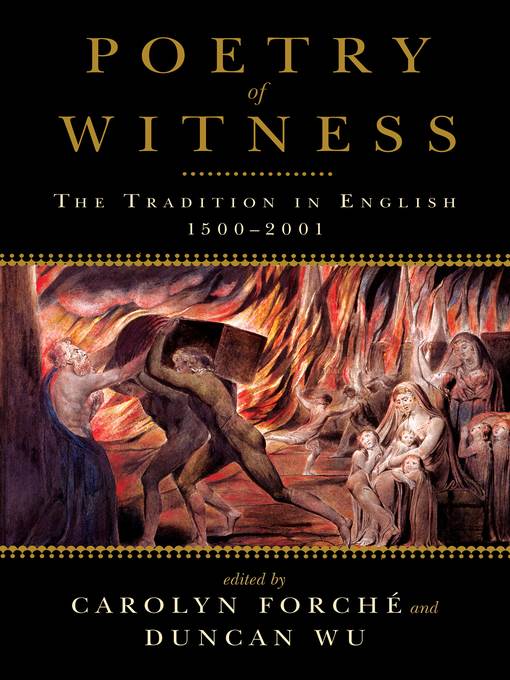
Poetry of Witness
The Tradition in English, 1500-2001
- اطلاعات
- نقد و بررسی
- دیدگاه کاربران
نقد و بررسی

Starred review from January 1, 2014
The 300 poems gathered so astutely in this authoritative and stirring anthology were written by poets of the past whose lives were changed, even destroyed, by war, oppression, imprisonment, torture, slavery, and exile. Poet Forch' (Blue Hour, 2003) has long been a champion and practitioner of poetry of conscience, creating the genre-defining Against Forgetting (1993). She now teams up with fellow English professor Wu to excavate the roots of this essential tradition of poetry that confronts evil and its embodiments in appeals for a shared sense of humanity and collective resistance. The sheer enormity of this living archive, an artistic record of five centuries of violence and suffering and protest and truth-telling, illuminates humankind at its most horrific and most glorious. The selections are blazing and haunting, poems of fierce precision, communal consciousness, courage, and reverberating beauty, and Forch' and Wu succinctly establish the historical context for each poet's work in glinting biographical essays. William Blake, John Keats, Walt Whitman, and Emily Dickinson are all seen from fresh vantage points. Here, too, are antislavery poet Lydia Maria Child; Olaudah Equiano, an enslaved Nigerian; Harlem Renaissance writer Claude McKay; WWII veteran and dissident Karl Shapiro; and conscientious objector William Stafford You walk on toward / September, the depot, the dark, the light, the dark. (Reprinted with permission of Booklist, copyright 2014, American Library Association.)

August 1, 2013
Two decades ago, Lannan Literary Award-winning poet Forche issued Against Forgetting, which included poems from more than 140 poets worldwide that bore witness to the violence of the 20th century. Edited with Georgetown English professor Wu, this companion volume offers 300 poems that examine a five-century tradition of protest in English-language poetry, embracing Shakespeare and Milton, religious martyr Anne Askew and Phillis Wheatley, abducted by slave traders. Proof positive that poetry matters.
Copyright 2013 Library Journal, LLC Used with permission.

November 15, 2013
Intended as a companion to editor Forche's Against Forgetting: Twentieth Century Poetry of Witness, this detailed anthology of poems of witness offers compositions that are, according to coeditor Wu, "acts of resistance." For each entry, Forche and Wu (editor, Romanticism: An Anthology) provide a one-page biography of the poet that includes a statement of why his or her poetry fits the collection's themes: war, tyranny, torture, slavery, and other forms of violence. These minibiographies make enticing reading and are full of little-known author facts. Six sections explore heinous executions by Henry the VIII, mass casualties in both the English and American civil wars, 20th-century poets writing about A-bomb testing, elegies to the war dead, and more. Only a small number of poems are from the 20th century, and the volume is also limited to English-language poems, thus excluding such great poets of witness as Anna Akhmatova, Paul Celan, Marina Tsvetaeva, Primo Levi, and others. VERDICT To complement Forche's earlier book, ending the collection in 1901 would have made more sense. However, because the last 20 years have seen such an outflowing of poems about war, torture, and violence, it seems remiss to ignore much of the 20th and early 21st century. [See Prepub Alert, 7/29/13.]--Doris Lynch, Monroe Cty. P.L., Bloomington, IN
Copyright 2013 Library Journal, LLC Used with permission.




دیدگاه کاربران